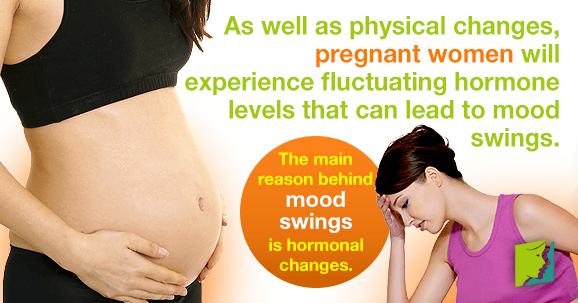During pregnancy, a woman's body undergoes various physical and physiological changes. Aside from a different appearance, an expecting mother will experience fluctuating hormone levels that can lead to mood swings during early pregnancy. Mood swings are common and may reappear during the third trimester when hormone levels increase.
What Are Mood Swings during Early Pregnancy?
Mood swings are when a person's temperament suddenly changes. Mood swings during early pregnancy mean that you can be happy one moment and sad the next, often without any identifiable reason. Mood swings are unpredictable and often beyond your control.
What Triggers Mood Swings during Early Pregnancy?
A number of factors can trigger mood swings during early pregnancy. The main reason is often hormonal changes occurring in your body. These changes are typically common during the first and third trimesters. Several stressors - such as concern for your child, financial circumstances, or drastic weight gain - can all increase problems with mood swings during early pregnancy.
Another cause of mood swings during early pregnancy is fatigue. The body has to work harder than normal, since it's feeding and nurturing two.
It's important for both partners to recognize that mood swings are a symptoms of the pregnancy and not allow them to damage their relationship. When you become pregnant, you should sit down with each other and go over the symptoms and consequences of pregnancy and discuss the impact each of these will have on your lives.
Managing Mood Swings in Early Pregnancy
There are many ways to manage mood swings during early pregnancy, such as:
- Getting plenty of rest
- Exercising regularly
- Maintaining a balanced diet.
- Taking prenatal vitamins
- Distracting yourself - see a movie with a friend, go for a walk, just generally change your surroundings
- Getting a massage or trying pregnancy yoga to help relax and lower stress.
If you're having a stressful time, try and set aside time to give yourself a mental break from everything. Remember, mood swings during early pregnancy will not last forever. This is not a permanent problem, and you should try to make sure that you and your partner work together to make sure nothing happens from this that damages your relationship.
If you find that your mood swings aren't getting better or you're spiraling into depression, please consult your doctor.
Click here to learn more about treatments for mood swings during early pregnancy.
Sources
- The Health Center.(n.d)."Adult Mood Swings". The Health Center. Retrieved from www.thehealthcenter.info.
- Dr. Love, Susan, and Karen Lindsey. Dr. Susan Love's Menopause and Hormone Book. New York: Three Rivers Press, 2003.
- Amin, Zenab, Turhan Canli, and C. Neill Epperson. "Effects of Estrogen-Serotonin Interactions on Mood and Cognition". Behav Cogn Neurosci Rev 2005; 4; 43.
- Molecular Psychiatry.(n.d)."Estrogen Promotes Gender Difference in Brain's Response to Stress". Retrieved from Molecular Psychiatry. www.psycheducation.org.




